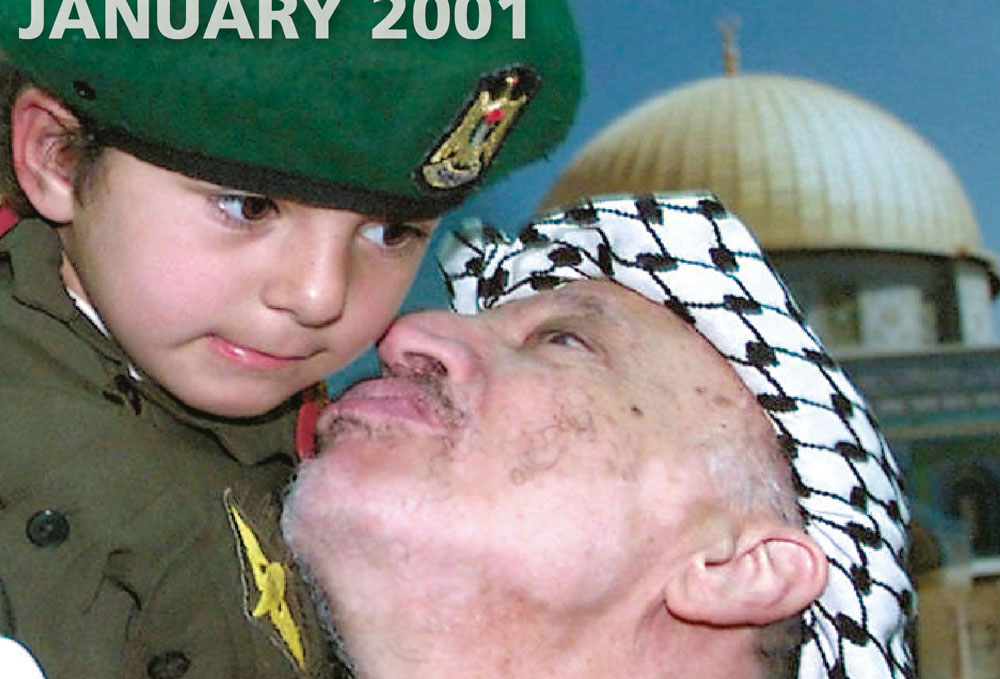THE ROVING DIPLOMAT
TRIBUTE SERIES
A FAILING PEACE PROCESS?
Palestine seeks assurances and assistance from Moscow and the Arab states
The stumbling peace process in the troubled Middle East is taking centre stage in world affairs with odd redeeming gestures such as India’s call for a ceasefire and US President Bill Clinton’s statesmanship in Vietnam recently.
Currently, the main preoccupation on the international scene is the Middle East peace process, which is rapidly deteriorating from a search for peace into what’s virtually a full-scale war between Palestine and Israel. Most alarming in all of this is the seeming inability of anyone to control the violence, which is escalating into a probable fully fledged Arab-Israeli war. This perilous situation represents a virtual breakdown of the intensive peace efforts in recent times, pursued by the American president through successive summits and talks with the two leaders.
It also seems as though President of the Palestinian National Authority Yasser Arafat is looking elsewhere for help and intervention with resolving the crisis. His latest move was a visit to Moscow to meet Russian President Vladimir Putin. And thereafter, he met with a number of Arab leaders in Cairo.
Putin is seizing the opportunity – especially in view of the apparent failure of US efforts to take the initiative to calm the situation. It is also significant that Russia has arranged a visit by Israeli Foreign Minister Shlomo Ben-Ami to Moscow as a follow-up to Arafat’s efforts.
The course of the current crisis seems to be leading to new developments, which could transform the character of the Arab-Israeli problem taken as a whole. One of them is the withdrawal of Egypt’s Ambassador to Israel by President Hosni Mubarak. In the context of Egypt’s relations with Israel, it is a serious blow to the latter.
Then there was the meeting of the Organisation of Islamic Cooperation (OIC) in Doha, which passed a number of resolutions on the prevailing crisis. But these have been derided by the Arab press as empty rhetoric and hollow words, and the OIC itself has been described as a ‘toothless tiger.’
Another similar initiative is the proposal made by Iranian President Mohammad Khatami of a four point Middle East peace plan – the aim of which in his own words, is to hold a referendum to establish a democratic Palestinian state over the whole of historical Palestine with the riven Jerusalem as its capital.
Meanwhile, Arafat’s leadership is being questioned by Palestinian militants with allegations of corruption at the hands of a coterie of his officials and followers. It seems as if an open armed conflict is imminent and this may explain the current political realignment in the region – with Egypt, Iran and other Arab states supporting Palestine, and making it a common cause in the name of Arab brotherhood.
In spite of all this, Arafat continues to maintain his desire for peace. A recent step in this direction was the reopening of liaison offices with Israel, following a telephone conversation with Israel’s Prime Minister Ehud Barak.
However, the reality seems otherwise and unless the Russian initiative through Putin has an impact, prospects for the peace process are gloomy. And the chance of a conflagration is high given the present mood of the Palestinians.
Closer to home, India has witnessed significant events on its foreign relations and domestic affairs fronts. New Delhi has taken the unilateral step of declaring a temporary ceasefire in much contested Kashmir in view of Ramadan.
The reactions to this initiative have been mixed. The response by the Kashmiri militant groups has been lukewarm. But the Hizb-ul-Mujahideen has said there is no meaning to or use in the ceasefire unless it leads to the initiation of a meaningful dialogue for the ultimate resolution of the Kashmiri conflict.
At the same time, pro-India groups in Kashmir have welcomed the ceasefire and called for a truce of six months, between Indian forces and the militants. Pakistan’s President Pervez Musharraf, during a meeting with a former Indian minister, had expressed a readiness to hold talks with India on the Kashmir dispute.
The ceasefire has been welcomed internationally with Russia and the UK favouring it. Though China has refrained from commenting on it, Beijing has expressed hope that the two countries would resolve their differences including the dispute over Kashmir through peaceful means. China maintains that its own position on Kashmir remains the same.




